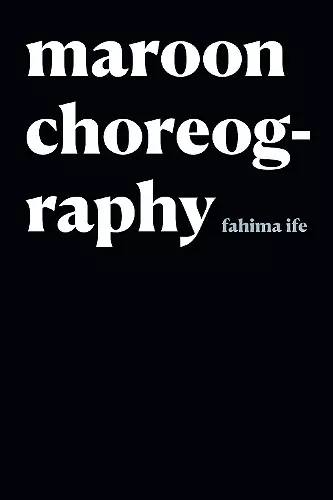Maroon Choreography
Format:Paperback
Publisher:Duke University Press
Published:27th Aug '21
Should be back in stock very soon
This paperback is available in another edition too:
- Hardback£72.00was £72.00(9781478013341)

In Maroon Choreography fahima ife speculates on the long (im)material, ecological, and aesthetic afterlives of black fugitivity. In three long-form poems and a lyrical essay, they examine black fugitivity as an ongoing phenomenon we know little about beyond what history tells us. As both poet and scholar, ife unsettles the history and idea of black fugitivity, troubling senses of historic knowing while moving inside the continuing afterlives of those people who disappeared themselves into rural spaces beyond the reach of slavery. At the same time, they interrogate how writing itself can be a fugitive practice and a means to find a way out of ongoing containment, indebtedness, surveillance, and ecological ruin. Offering a philosophical performance in black study, ife prompts us to consider how we-in our study, in our mutual refusal, in our belatedness, in our habitual assemblage-linger beside the unknown.
Duke University Press Scholars of Color First Book Award recipient
“Maroon Choreography reads like liner notes for a dance unwitnessed except by sound, or a dramaturgy for a dance recorded by the mud and roots of trees who would have been the only audience. It is obscure but everywhere. More unknowable than little known. It participates in the important recent critical practice that goes beyond applying or extending theory and instead insists there is something else to perceive and another way to perceive it.” - Alexis Pauline Gumbs, author of (Dub: Finding Ceremony) “With great erudition and deep musicality, fahima ife has written a funky, rigorous, and lyrical investigation of what it is to have been made to have and not have a body. An incredible tempest of a book.” - Fred Moten, author of (Black and Blur) “ife invokes recent thinkers for whom the inherited rules and categories of what we have learned to call civilization look like acts of Western oppression. Against those categories, with sublimity and verve, ife’s verse raises up a defiant ‘queeribbeanness,’ celebrating ‘unruly contemporary dancers’ and other ‘black bodies” that ‘struggle to name our lives as sovereign, on our own terms.’ Spectacularly allusive in its canny, concise segments, sometimes programmatic but more often simply learned, Ife’s ‘tremulous / antegrammatical’ work invokes ‘the black morning of baldwin / across the river in another country.’” - Stephanie Burt (New York Times Book Review) "Reading this text is an exercise in letting go of the familiar to practice otherwise. Through breathing, sitting, humming, and pausing with this text I am consistently reminded (as if one could forget) that our compulsory education systems are colonially choreographed. . . . To engage with this book in the field of comparative and international education is to practice asking more of ourselves and our work while making another world possible." - Cee Carter (Comparative Education Review) “It is not often that an academic text takes you on a journey. fahima ife’s book of essays and poetry, Maroon Choreography, invites us to theorize not by defining and analyzing but rather by inhabiting an undocumented past of escape from slavery that links to present-day escapes from slavery’s afterlife. In this process of imagining, the text engages with an important conversation within Black studies, critical theory, and performance studies.” - Omar Ricks (Dance Chronicle) "Maroon Choreography . . . inspires as possibility for what poetry might be, how it might bring forth homage and critical theory about Blackness in new forms and fresh ways of thought. It disassembles. I’m drawn to books of all sorts that unravel dominant discourses that plague our imaginations, and ife does that." - Dawn Lundy Martin (Brooklyn Poets) "Maroon Choreography . . . . [is] a radical work that emerges from centuries of the informal, from the pneumatic symphony of all of us, but specifically of Blackness, 'in the slickness of joy,' and takes to the snake with great force. ife proposes questions that are rarely asked, perspectives refusing popular thought. They invite us to sit with them, to float, ascend, transcend, practice, to move through something not written by the choreography of coloniality - and to breathe 'in the upper air unseen.'" - Cameron Lovejoy (Fugue) "For those working at the intersection of pedagogy, cultural studies, literature, and the broader humanities, maroon choreography will be an invaluable occasion to question the foundations of our knowledge and practice and re-examine our basic assumptions. Scholars in Black, Latinx, and American Studies will find this book particularly indispensable as we come to a more reflective moment following the 2020 uprisings, and especially as we consider how the resources of our intellectual projects might contribute to the struggle for justice and decolonization in Palestine." - Walter Lucken IV (Lateral)
ISBN: 9781478014256
Dimensions: unknown
Weight: 249g
144 pages